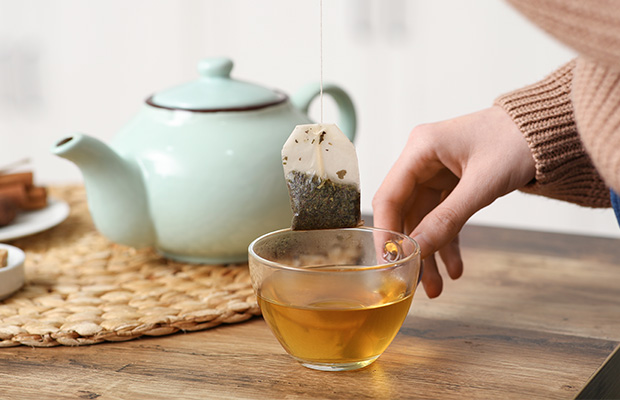If you enjoy a cup of tea, you might have been pleased to see the latest news reports that regularly drinking tea for many years may lower your risk of dying from heart or circulatory disease.
According to a study recently covered by UK media outlets, adults who drink up to two cups of tea a day for more than seven years have a 19 per cent lower risk of dying from a heart attack or stroke than those who drink less, or no tea at all.
Every extra cup of tea a day lowered their risk by 4 per cent, suggests the research published in March in the journal Current Developments in Nutrition.
However, the research does not say which types of tea these people were drinking – we do not know if it was black, green or herbal tea, or if people added milk or sugar to their brew.
The study also looked at the effect of coffee, alcohol, soft drinks (with added sugar or artificial sweeteners), fruit juice and energy drinks on people’s risk of dying from a heart problem.
Overall, the researchers looked at 20 published studies from around the world.
Out of the six drinks, only tea was linked to a lower risk of death from heart disease in both men and women.
Men who drank coffee every day for many years were also found to have a 37 per cent lower risk of dying compared to those who drank it infrequently.
But women who drank coffee long-term did not have a lower risk of death compared to those who did not.
Drinking a lot of alcohol and sugary soft drinks for years had the opposite effect. The study showed that people’s risk of dying from heart and circulatory disease was about 30 per cent higher if they drank one serving or more a day of either beverage over many years.
Yet, the study found that drinking artificially sweetened (diet) soft drinks did not affect people’s risk of this type of death.
When it came to fruit juice and energy drinks, the researchers said there was not enough data on them to come to any conclusions.
What do the researchers say?
The international team of researchers led by the University of New South Wales in Australia, included tea in their analysis on the back of an earlier study that suggested tea may be beneficial for the heart.
This study, published in the Annals of Internal Medicine in 2022, found that those who drank one to two cups of tea a day had a moderately lower risk of dying from any cause after 11 years than those who did not drink any.
But the participants were only asked how much tea they drank once, at the beginning of the study.
To get a more accurate idea of how long-term tea drinking affects the risk of death from heart or circulatory disease, this new research looked at two studies that asked people how often they drank tea over several years.
One study from the United States followed people for an average of 7.3 years, and the other based in China followed them for an average of 18.5 years.
Both studies asked participants about their tea drinking habits at the start of the study and at least one more time during it.
Want to get fit and healthy?
Sign up to our fortnightly Heart Matters newsletter to receive healthy recipes, new activity ideas, and expert tips for managing your health. Joining is free and takes two minutes.
I’d like to sign-up
How good was the research?
One of the biggest flaws in the research is that we do not know what type of tea people were drinking.
In both studies, participants were only asked if they drank tea. This included green tea, black tea and other teas.
This means some people may have only had green tea, while others may have drunk black tea with milk and added sugar.
The frequency people drank tea also varied between the two studies, making it hard to come up with a clear answer as to a healthy amount.
In the US study, those who drank the most tea had more than two cups a day, while those who had the least had one or no tea per month.
In the China study, those who drank the most had three or more servings a week compared to people who drank less than three cups a week, or never drank tea.
Both studies were observational too. This means that while they linked tea to a lower risk of dying from heart disease, they do not prove that it directly affects people’s risk.
Similar issues were seen in the studies that looked at the other types of drinks.

How good was the media coverage?
The study caught the attention of two UK newspapers, the Daily Mirror and The Sun.
Both newspapers' headlines said that tea was the best drink for “protecting your heart”.
This may be misleading, as the research did not prove cause and effect, just that people who drink a lot of tea over many years have a lower risk of dying from heart and circulatory disease.
The Daily Mirror reported that the study found “fizzy drinks” can increase the risk of heart disease.
This was incorrect, as the study looked at soft drinks with added sugar, which may not be fizzy.
Meanwhile, The Sun quoted Dr Carrie Ruxton (PhD), a dietitian at the Tea Advisory Panel, which is funded by the tea industry.
Dr Ruxton told The Sun that the study “shows the benefits of starting a long-term tea drinking habit from early adulthood or even childhood”.
However, the study only looked at adults over the age of 18, so more research is needed to confirm how drinking tea in childhood can affect your risk of dying from heart disease.
The BHF verdict
While it does not prove cause and effect, this study does seem to support earlier research linking tea to heart health benefits.
But if you enjoy drinking tea, try not to add sugar, or use a low-fat milk if you’re having several cups a day.
This is because eating too much sugar and saturated fat can lead to weight gain and increased cholesterol levels, which increases your risk of heart and circulatory conditions including heart attack and stroke.
This is why it’s not surprising that the study found that drinking lots of sugary drinks increased the risk of dying from coronary heart disease.
The study also shows that further research is needed into the effects of other soft drinks like fruit juices and energy drinks.
But we already know these drinks often have a lot of added sugar.
So, if you’re drinking them, stick to smaller portions or sugar-free versions.
What to read next...










